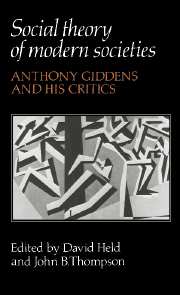Book contents
- Frontmatter
- Contents
- List of contributors
- List of abbreviations
- Editors' introduction
- 1 Social theory as critique
- 2 Hermeneutics and modern social theory
- 3 The theory of structuration
- 4 Models of historical trajectory: an assessment of Giddens's critique of Marxism
- 5 Capitalism, nation-states and surveillance
- 6 War and the nation-state in social theory
- 7 Only half the story: some blinkering effects of ‘malestream’ sociology
- 8 Citizenship and autonomy
- 9 Presences and absences: time–space relations and structuration theory
- 10 Space, urbanism and the created environment
- 11 On the (ir)relevance of structuration theory to empirical research
- 12 A reply to my critics
- Select bibliography
- Index
8 - Citizenship and autonomy
Published online by Cambridge University Press: 24 November 2009
- Frontmatter
- Contents
- List of contributors
- List of abbreviations
- Editors' introduction
- 1 Social theory as critique
- 2 Hermeneutics and modern social theory
- 3 The theory of structuration
- 4 Models of historical trajectory: an assessment of Giddens's critique of Marxism
- 5 Capitalism, nation-states and surveillance
- 6 War and the nation-state in social theory
- 7 Only half the story: some blinkering effects of ‘malestream’ sociology
- 8 Citizenship and autonomy
- 9 Presences and absences: time–space relations and structuration theory
- 10 Space, urbanism and the created environment
- 11 On the (ir)relevance of structuration theory to empirical research
- 12 A reply to my critics
- Select bibliography
- Index
Summary
In this chapter, I wish to cut a particular path through Anthony Giddens's work by focusing on the way in which he interprets the relationship between citizenship, capitalism and the possibilities of a new ‘progressive’ politics. I believe this to be a particularly fertile domain in which to assess his writings because it is in exploring the interconnections between class, citizenship and related phenomena that Anthony Giddens analyses some of the key features of modern society and evaluates some of the key contributions of the major traditions of political and social theory: above all, those of liberalism and Marxism. It will be my contention that there are ambiguities at the very heart of Anthony Giddens's project. While he unquestionably makes a major contribution to rethinking social and political theory today, there are a number of essential questions which remain unanswered in his work – questions which cast doubt on the coherence of central parts of his project as it is currently formulated.
The chapter has a number of sections. In the first part, I examine T. H. Marshall's classic study, ‘Citizenship and Social Class’. In a number of his works Giddens focuses attention on Marshall's contribution; for Marshall's work is a – if not the – classic treatment of the relationship between class and citizenship, capitalism and democracy (see CCHM, pp. 226–9; PCST, pp. 164–80; NSV, pp. 198–209). In the second part I shall argue that Giddens is right to focus attention on Marshall, but that many of Giddens's specific criticisms of Marshall are misconceived.
- Type
- Chapter
- Information
- Social Theory of Modern SocietiesAnthony Giddens and his Critics, pp. 162 - 184Publisher: Cambridge University PressPrint publication year: 1989
- 24
- Cited by



